
Lionhead Studios, who are responsible for Black & White and Fable, aren’t the only ones building a morality system into their games. Mass Effect and Infamous use this tool in the same way as mentioned above. Morality, however, goes a lot further than giving players the choice to be charitable or selfish though.
Perhaps you haven’t realised it before but in Legend of Zelda: Ocarina of Time Ganon’s red blood was turned green. This was to provide it with a better rating in certain countries, but on a psychological level it makes you aware that what you’re killing isn’t of this world.
Looking back, I can’t remember playing a game in my childhood that consisted of bloody scenes. There was Turok 2: Seeds of Evil, but you’re slaughtering lizard aliens in that game so it’s easier to justify. Even John Carmack has said he found it easier shooting demons and zombies than humans because those types of enemies are clearly non-human. It would be immoral not to kill a demon or a zombie, wouldn’t it?
The older generation didn’t use moral systems because there wasn’t a decision to be made. The enemy was evil and you are supposed to stop them, not side with them. We’re now in a time where games can tackle more profound topics though, like what defines a hero from a villain. Games are actually really good at making us the villain. I can’t think of a single action game (and even some racing games) where killing isn’t the solution. Doesn’t that deliver the wrong message though, especially in games where the enemy isn’t as clean-cut as an alien or a demon hell-bent on destruction?
Let me just flip my hypothetical coin into the air and, would you look at that, it’s landed on its hypothetical other side! Not all games force morality on us so directly. Some games, like The Sims and The Simpsons: Tapped Out, cater to our sympathetic and maternal/paternal sides. There is something about building a house, or a zoo, or an entire city, and adopting an omnipotent position where our desire isn’t to torture our subjects, but to help them prosper instead.
 Games that give us a God-like perspective and let us create our own civilisation or business taps into our ego, and even though these types of games don’t have an ending that doesn’t prevent us from wanting to achieve things as quickly as possible. I’m addicted to The Simpsons: Tapped Out right now and the purpose of the game is to rebuild Springfield. However, there is no rule saying I have to build a great Springfield. There’s no rule saying I have to make the characters happy, but for reasons I cannot explain I want to make it bigger, better, and prettier. The reason is probably greed, but I like to think that this is evidence that not all games turn us into monsters.
Games that give us a God-like perspective and let us create our own civilisation or business taps into our ego, and even though these types of games don’t have an ending that doesn’t prevent us from wanting to achieve things as quickly as possible. I’m addicted to The Simpsons: Tapped Out right now and the purpose of the game is to rebuild Springfield. However, there is no rule saying I have to build a great Springfield. There’s no rule saying I have to make the characters happy, but for reasons I cannot explain I want to make it bigger, better, and prettier. The reason is probably greed, but I like to think that this is evidence that not all games turn us into monsters.
During university I was addicted to Dream Zoo, a mobile game that lets you build your own zoo with multi-coloured animals. For me, the addiction was collecting as many animals as possible. It was that thirst for completion, and yet in my heart I knew the game could never be finished. Maybe giving digital animals a loving home was enough.
I eventually got bored and deleted the app.
Anyway, my point is if you give gamers explosives they’ll blow the world up, but give them a hammer and a bag of nails and they’ll rebuild it. You don’t need a morality system to see gamers make those decisions.
– Lee Chesnalavage


